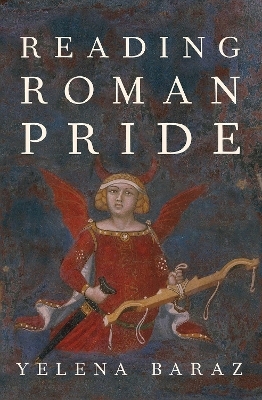
Reading Roman Pride
Oxford University Press Inc (Verlag)
978-0-19-753159-4 (ISBN)
Pride is pervasive in Roman texts, as an emotion and a political and social concept implicated in ideas of power. This study examines Roman discourse of pride from two distinct complementary perspectives. The first is based on scripts, mini-stories told to illustrate what pride is, how it arises and develops, and where it fits within the Roman emotional landscape. The second is semantic, and draws attention to differences between terms within the pride field. The peculiar feature of Roman pride that emerges is that it appears exclusively as a negative emotion, attributed externally and condemned, up to the Augustan period. This previously unnoticed lack of expression of positive pride in republican discourse is a result of the way the Roman republican elite articulates its values as anti-monarchical and is committed, within the governing class, to power-sharing and a kind of equality. The book explores this uniquely Roman articulation of pride attributed to people, places, and institutions and traces the partial rehabilitation of pride that begins in the texts of the Augustan poets at the time of great political change. Reading for pride produces innovative readings of texts that range from Plautus to Ausonius, with major focus on Cicero, Livy, Vergil, and other Augustan poets.
Yelena Baraz is Kennedy Foundation Professor of Latin Language and Literature, Professor of Classics, and Acting Director, for the Society of Fellows in the Liberal Arts at Princeton University. She received a BA in Latin from Brooklyn College, CUNY, PhD in Classics from University of California, Berkeley, and was the American Fellow at the Thesaurus Linguae Latinae in Munich.
Acknowledgments
Introduction
Pride and Roman Pride
Scripts and Words
Scope
Structure
Part One: Scripts and Words: General Approaches to Roman Pride
Chapter One: Semantics
adrogantia
fastus
insolentia
Chapter Two: Stages
Causes of Pride
Proud Behaviors
Reacting to Pride
Chapter Three: The Peculiar Case of the superbia Group
Conclusion (Part 1)
Part Two: Scripts: Institution and Place
Chapter Four: Kingship
The Pretenders
Spurius Cassius Vecellinus
Spurius Maelius
Marcus Manlius Capitolinus
The counterexample: Scipio Africanus
Cicero and Other Kings
Chapter Five: Capua
Ausonius' urbs nobilis
Capua as a Rival Capital in Cicero's Agrarian Speeches
Hannibal, Capua, and the Second Punic War in Livy and Silius Italicus
Conclusion (Part 2)
Part Three: Words: The Transformation of superbia
Chapter Six: Vergil's Aeneid, Pride Unsettled
Troy
Carthage
Athletic Victories
The Iliadic Half
Turnus and the End
Tarquinius and Brutus, Agrippa and Augustus
Appendix: Gods' Lovers, Gods' Helpers, Gods' Human Pets
Chapter Seven: Transformation of Pride in Augustan Poetry
Triumph and Defeat in Horace, Carmina 1
Pride and Love
Pride and Poetry
The Late-Augustan Aftermath
Chapter Eight: Positive Pride in Post-Augustan Literature
Poetic Pride
Pride in the Public Sphere
Pride by Association
Flavian Epic
Positive Pride in Pliny the Elder
Conclusion (Part 3)
Coda
Bibliography
Index Locorum
General Index
| Erscheinungsdatum | 11.11.2020 |
|---|---|
| Reihe/Serie | Emotions of the Past |
| Verlagsort | New York |
| Sprache | englisch |
| Maße | 236 x 155 mm |
| Gewicht | 635 g |
| Themenwelt | Literatur ► Lyrik / Dramatik ► Lyrik / Gedichte |
| Geisteswissenschaften ► Geschichte ► Allgemeine Geschichte | |
| Geisteswissenschaften ► Philosophie ► Philosophie Altertum / Antike | |
| ISBN-10 | 0-19-753159-8 / 0197531598 |
| ISBN-13 | 978-0-19-753159-4 / 9780197531594 |
| Zustand | Neuware |
| Informationen gemäß Produktsicherheitsverordnung (GPSR) | |
| Haben Sie eine Frage zum Produkt? |
aus dem Bereich


